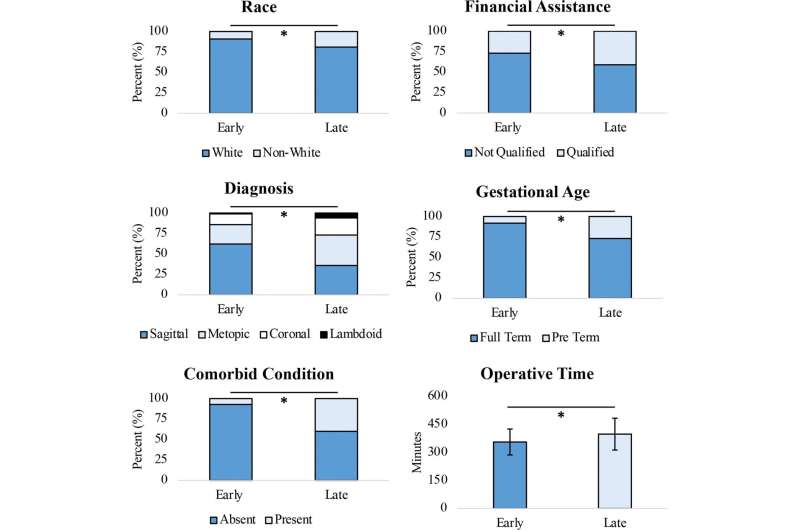This article has been reviewed according to Science X's editorial process and policies. Editors have highlighted the following attributes while ensuring the content's credibility:
fact-checked
peer-reviewed publication
trusted source
proofread
Social and medical factors may explain cognitive impact of delayed craniosynostosis surgery

For infants with the skull deformity craniosynostosis, head reshaping surgery after age 12 months has long been linked to impaired cognitive and language development. Now a new study suggests that the difference in developmental outcomes may reflect a range of other patient characteristics and clinical factors affecting age at surgery, reports the April issue of Plastic and Reconstructive Surgery.
"Multiple factors may affect cognitive outcomes in infants undergoing craniosynostosis surgery, regardless of patient age at the time of surgery," comments ASPS Member Surgeon Steven R. Buchman, MD, of University of Michigan. "Our study suggests that children who undergo surgery later have characteristics that independently predispose them to both delayed surgery and impaired neurocognitive development."
How does timing of surgery affect cognitive development in craniosynostosis?
Craniosynostosis is a common skull deformity occurring when the joints (sutures) between the bones of the skull close prematurely. Craniosynostosis surgery is performed to correct the abnormal head shape and allow the growing brain room to expand normally.
In 1988, a research article suggested that children undergoing craniosynostosis surgery after 12 months of age were at risk of delayed neurocognitive development. Subsequent studies seemed to support this conclusion. However, few studies have evaluated other factors that might affect the risk of developmental delay after craniosynostosis surgery.
What's the real effect of surgical timing on cognitive outcomes? Dr. Buchman and colleagues evaluated their center's experience in 227 infants undergoing craniosynostosis surgery between 2009 and 2020. All patients had craniosynostosis involving a single skull suture, unrelated to any genetic syndrome.
Head reshaping surgery (cranial vault remodeling) was performed before age 12 months in 157 infants and after 12 months in 70 infants. Average age was 8 months in the early-surgery group versus 18 months in the late-surgery group.
Delays to head reshaping linked to socioeconomic and clinical factors
Several patient characteristics differed between groups. Nineteen percent of children with delayed surgery were of non-White race/ethnicity, compared to nine percent of the early-surgery group. Children in the delayed-surgery group were more likely to qualify for need-based financial assistance such as Medicaid: 41% versus 21%.
There were also differences in key clinical factors. Children with delayed surgery were more likely to have preterm birth, 25% versus 10%; and had higher rates of other health problems (comorbidity), 40% versus less than 10%. On standard assessments of child development performed before surgery, 15% of children in the delayed-surgery group had cognitive delays, compared to three percent in the early-surgery group.
"These results demonstrate an association between patients who undergo surgery after 12 months of age and patients who identify with a minority race and/or experience socioeconomic disadvantage," the researchers write. These and other differences in patient characteristics raise questions about how the timing of craniosynostosis surgery affects early-childhood cognitive development.
"The overarching purpose of this paper is to demonstrate that certain factors may predispose patients to delayed cranial vault remodeling and introduce selection bias toward slowed neurocognitive development," Dr. Buchman and colleagues conclude. They call for further studies in larger groups of children with craniosynostosis to determine which factors have the greatest impact on age at surgery and cognitive development.
More information: Jeremy V. Lynn et al, Surgical Timing and Neurocognitive Development among Patients with Craniosynostosis: Analysis of Confounders, Plastic & Reconstructive Surgery (2023). DOI: 10.1097/PRS.0000000000010004



















